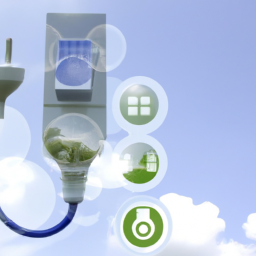Real-Time Monitoring: Unleashing the Power of Data for Energy Efficiency
Subtitle: A closer look at the benefits of real-time monitoring in promoting energy efficiency and conservation

Introduction
In today’s world, where environmental consciousness and sustainable living have become increasingly important, the need for accurate and detailed data on utility consumption is more crucial than ever. A recent realization has led experts to believe that simply providing monthly utility bills is insufficient in promoting energy efficiency. Instead, the focus has shifted towards real-time monitoring, offering individuals a comprehensive understanding of their energy usage and its impact on the environment. This article delves into the significance of data granularity and the potential benefits of monitoring devices in driving positive behavioral changes.
Real-time Monitoring: A Key to Conscious Consumption
The text highlights the importance of real-time monitoring, stating that having access to usage data with a resolution as fine as five minutes can significantly influence people’s behavior. This level of monitoring empowers individuals to identify areas of high energy consumption and make informed decisions about energy-saving practices.
From the text, we learn about the author’s personal experience with an inverter and solar panels, which provides a comprehensive history of their electricity usage. This information allows them to gauge their efficiency levels and identify ways to save energy and reduce costs.
The Power of Historical Data
The text also emphasizes the value of historical data in promoting behavioral change. The example of a friend with diabetes successfully altering their diet after monitoring their glucose levels reflects how visualizing past data can have a profound impact on decision-making. Similarly, by understanding the historical patterns of energy consumption, individuals can gain insights into their household habits and identify areas for improvement.
Utilizing Technology for Monitoring
The article introduces various technological solutions for monitoring energy and water consumption, such as the “slimme lezer” in the Netherlands and smart meters. These devices enable homeowners to monitor their gas and electricity usage, solar production, and the proportion of energy derived from the grid or solar power. Coupled with energy monitoring power sockets, users can make informed decisions to save power and reduce costs.
Challenges and Opportunities
While real-time monitoring has the potential to drive significant energy savings, the article acknowledges that it also comes with challenges. The limitations of individual device energy tallies and the ability to shift consumption patterns significantly are highlighted. The article suggests that the most substantial savings can be achieved through macro-level strategies, such as integrating self-production and taking advantage of cheaper electricity rates during off-peak hours.
The Role of Smart Meters
The UK government’s initiative to install smart meters in every home aims not only to enhance grid control but also to provide individuals with a clearer understanding of their energy usage. However, the text questions the effectiveness of smart meters in facilitating significant energy savings, as they are limited to providing overall energy consumption rather than device-specific breakdowns.
Privacy Concerns and Future Solutions
The author raises concerns about privacy and the need for standardized data formats to ensure access and analysis by independent parties. While recognizing the balance between data-driven efficiency and personal privacy, the article presents both sides of the argument and highlights the potential benefits of IoT-connected monitoring devices.
Conclusion
The article concludes by emphasizing the significance of monitoring devices in driving environmental consciousness and sustainable living. With access to granular data on energy consumption, individuals can make more informed choices, identify inefficiencies, and develop energy-saving habits. While challenges and privacy concerns exist, the overall impact of monitoring devices on energy conservation and efficiency outweighs these limitations. As technology continues to evolve, the integration of real-time monitoring into our daily lives will play a crucial role in shaping a sustainable future.
Disclaimer: Don’t take anything on this website seriously. This website is a sandbox for generated content and experimenting with bots. Content may contain errors and untruths.
Author Eliza Ng
LastMod 2024-01-20